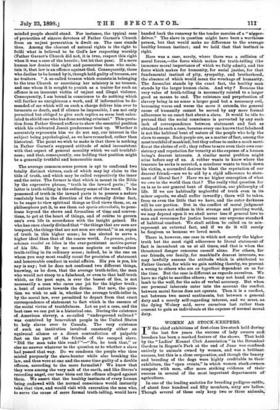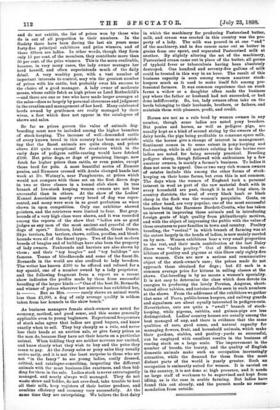WOMEN AS STOCK-KEEPERS.
/N the chief exhibitions of first-class live-stock held during- the last few years the success of lady owners an& breeders has been a marked feature of the shows. That held by the "Ladies' Kennel Club Association" in the Botanical Gardens in Regent's Park at the end of Jane was confined. entirely to animals owned by women, and was a brilliant success, but this is a close corporation, and though the beauty and breeding of the dogs were highly creditable to their- exhibitors, the "open events," in which women stock-owners compete with men, offer more striking evidence of their- success in several of the most important departments of agriculture.
In one of the leading societies for breeding pedigree cattle,. of about four hundred and fifty members, sixty are ladies.. Though several of these only keep two or three animals, and do not exhibit, the list of prizes won by those who do is out of all proportion to their numbers. In the Society there have been during the last six years some forty-five principal exhibitors and prize winners, and of these fifteen are ladies. In other words, though they form only 13 per cent, of the members, they contribute more than SO per cent. of the prize winnet s. This is the more creditable, because, in very many cases, the lady owner manages her herd herself, and often superintends much of the daily detail. A very wealthy peer, with a vast number of important interests to control, may win the greatest number
of prizes with his cattle, but probably owes his success to the choice of a good manager. A lady owner of moderate
means, whose cattle fetch as high prices as Lord Rothschild's —and there are one or two who have made larger averages at the sales—does so largely by personal cleverness and judgment in the creation and management of her herd. Many celebrated herds owned by gentlemen are really managed by their wives, a fact which does not appear in the catalogues of shows and sales.
So far as prices govern the value of animals dog- breeding must now be included among the higher branches of stock-keeping. The increase of well- descended cattle of every known breed in this country has been so astonish- ing that the finest animals are quite cheap, and prices above 240 quite exceptional for creatures which in the early days of pedigree cattle-rearing would have fetched 2100. But prize dogs, or dogs of promising lineage, now fetch far higher prices than cattle, or even ponies, except those bred for polo. A most beautiful series of Exmoor ponies, and Exmoors crossed with Arabs changed hands last week at Dr. Watney's, near Pangbourne, at prices which would not compare with those set on the first dozen dogs in two or three classes in a kennel club show. In this branch of live-stock keeping women owners are not less successful than in others. At the show of the Ladies' Kennel Association nearly every breed of dog was repre- eented, and many were seen in as great perfection as when shown in open competition. Only one exhibitor showed pointers, and the retrievers were limited to four. But grey- hounds of a very high class were shown, and it was recorded among the reports of the show that "ladies are as good judges as any men of the most ancient and graceful of the dogs of sport." Setters, Irish wolfhounds, Great Danes, Skye terriers, fox terriers, chows, collies, poodles, and blood- hounds were all of the finest types. Two of the best modern breeds of beagles and of bulldogs have also been the property of lady owners. Foxhounds and barriers are also shown by them ; and their "toy beagles" and "toy bulldogs" are famous. Teams of bloodhounds and some of the finest St. Bernards in the world are also credited to lady breeders. The writer has known 2200 to be offered and refused for a toy spaniel, one of a number owned by a lady proprietor, and the following fragment from a report on a recent show indicates the profits made by them from successful breeding of the larger kinds :—" One of the best St. Bernard% and winner of prizes wherever her mistress has exhibited her, is —. But as Mrs. rarely shows an animal worth less than 21,000, a dog of only average quality is seldom taken from her kennels to the show bench."
As business managers female stock-owners are noted for economy, method, and good sense, and this seems generally applicable even to young beginners. Experienced frequenters of stock sales agree that ladies are good buyers, and know exactly when to sell. They buy cheaply as a rule, and never lose their heads at an auction sale, or give fancy prices as the men do, because they have set their hearts on a particular animal. When bidding they are neither nervous nor excited, and know clearly what they wish to buy and the price they mean to pay. At the Jersey sales or pony sales they usually arrive early, and it is not the least surprise to those who are not "in the fancy" to see young ladies, coolly dressed, critical, and catalogue-consulting, inspecting the different animals with the most business-like exactness, and then bid- ding for them in the sale. Ladies stock is never extravagantly managed, and nearly always well managed. They do not waste straw and fodder, do not over-feed, take trouble to test all their milk, keep registers of their butter produce, and combine efficiency and economy very successfully. At the same time they are enterprising. We believe the first dairy
in which the machinery for producing Pasteurised butter, milk, and cream was erected in this country was the pro-
perty of a lady. The milk was poured in at one "end" of the machinery, and in due course came out as butter in grains from one spout, and separated Pasteurised milk at another. By slightly altering the set of the machinery, Pasteurised cream came out in place of the butter, all germs of typhoid fever or tuberculosis having been absolutely destroyed. One hundred and seventy-five gallons of milk could be treated in this way in an hour. The result of this business capacity is seen among women amateur stock- keepers much as it used to make itself felt among pro- fessional farmers. It was common experience that on stock farms a widow or a daughter often made the business pay where the father or husband had not succeeded, or had done indifferently. So, too, lady owners often take on the herds belonging to their husbands, brothers, or fathers, and maintain them with pleasure, profit, and credit.
Horses are not as a rule bred by women owners in any number, though some ladies are noted pony breeders.
But ponies and horses, as well as pedigree pigs, are
usually kept as a kind of second string by the owners of the dairy herds, the pigs being profitable to consume spare milk, while the horses give a change of interest in management.
Sentiment comes in to some extent in pony-keeping and foal-rearing, while in all matters relating to the bovine race ladies are noted for being severely practical. Breeding pedigree sheep, though followed with enthusiasm by a few amateur owners, is mainly a farmer's business. To ladies it does not seem to appeal. One or two very rich women owners of estates include this among the other forms of stock- keeping on their home farms, but even this is not common.
The days when the women of England took a personal interest in wool as part of the raw material dealt with in every household are past, though it is not long since, in country districts, the wool of every black lamb or black sheep in the flock was the women's perquisite. Goats, on the other hand, are very popular, one of the most successful breeders being the Baroness Burdett-Coutts, who has taken an interest in improving these animals and in introducing foreign goats of high quality from philanthropic motives, and with the object of impressing the public with the value of these creatures to poor families in town and country. Poultry breeding, the "revival" in which branch of farming was at the outset largely in the hands of ladies, is now mainly carried on by men. Women exhibitors bear a very small proportion to the rest, and their main contribution at the last Dairy Show was "table poultry." Out of fifteen hundred ex- hibitors of poultry and pigeons at this Show only eighty-five were women. Cats are now a serious and remunerative object of the stock-owner's care ; the prices made do not approach those obtained for dogs ; but 22 each is a, common average price for kittens in selling classes at the shows. Cat-breeding is by no means a woman's speciality. It is not easy to determine the class which does devote its energies to producing the lovely Persian, Angoras, short- haired silver tabbies, and tortoise-shells seen in such numbers at the shows. From the addresses of the exhibitors we gather that sons of Peers, public-house keepers, and railway guards and signalmen are about equally interested in pedigree-cats. Nevertheless, cats are quite a "swell" branch of stock- keeping, while pigeons, rabbits, and guinea-pigs are less distinguished. Ladies' country houses are usually among the best managed of any, and there is evidence that the same qualities of care, good sense, and natural capacity for managing flowers, fruit, and household animals, which make their gardens, stables, and poultry - yards so successful, can be employed with excellent results in the business of rearing stock on a large scale. The improvement in the number of breeds, the beauty, and the quality of English domestic animals make such an occupation increasingly attractive, while the demand for them from the most distant parts of the world is yearly greater. Such an occupation is eminently suited for women. It is carried on in the country, it is not done at high pressure, and it needs no large staff of workmen to be supervised and kept from idling, as is the case in arable farming. But ladies have found this out already, and the pursuit needs no recom- mendation from outside.



































 Previous page
Previous page